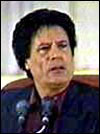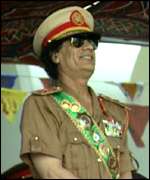




























|

|

|

|

|

|

|

|

|

|

|

|

|

|

|

|

|

|

|

|

|

|

|

|

|

|

|

|
|
|
|

|
|
|
COLONEL MU'AMMAR GADHAFI |
|


|
|
|
Colonel Mu'ammar Gadhafi, strongman of the North African country Libya is a leader who has and continues to evoke mixed reactions around the world, depending on which side of the political aisle one is on. To most Africans and in the Arab world, he is secretly admired for his bold and often arrogant position he takes towards Western countries who in turn naturally hate him with a passion. In black Africa, he is particularly respected for the help he gave Nelson Mandela and his ANC in the struggle against apartheid. The same goes for Cuban strongman Fidel Castro and PLO leader Yasser Arafat. Colonel Gadhafi's rise to power closely resembles that of the other great arab nationalist Gamal Abdel Nasser of neighbouring Egypt who also came from a military academy and fed off anti-western politics. Just like Nasser had done in Egypt, Gadhafi came to power by first joining the military then ousting King Idris Senussi I, whose monarchy had close ties to the west. Gadhafi has had several run-ins with different US administrations who have accused him of financing international terrorism. On April 15 th 1986 US President Ronald Reagan ordered surprise US Airforce attacks on the Libyan cities of Tripoli and Benghazi that resulted in around 20 deaths including Gadhafi's own infant daughter. Eventhough many expected retaliation against the US from the mercurial Gadhafi, he has since surprised his friends and foes alike by taking uncharacteristic moderate stances on many issues, even remaining totally silent on others. Gadhafi's recent behaviour can be attributed to various reasons including, the demise of his strong backers the Soviet Union, further fragmentation and westernization of the Arab world, Libya's weak economic position under US-led sanctions or even simply, just an aging and tired African soldier. Mu'ammar Gadhafi was born in 1942 in the Libyan desert town of Sirte. He hails from the nomadic Bedouin community in North Africa. His antagonism towards the West began at a very early age given that his own grandfather had been killed in 1911 by Italian colonialists. Gadhafi received traditional religious primary education before enrolling at the Sebha Preparatory School in Sidra in 1956. Reports have it that he was not only a brilliant student but a very politically active one too. His political ideologies were greatly influenced by those of Gamal Abdel Nasser of neighbouring Egypt. His political activism finally led to his expulsion from Sebha Preparatory after which, he followed Nasser's lead and ventured into the military. He joined the military academy in Benghazi in 1963 and graduated in 1965 before proceeding to Britain for further training. He returned to Libya a year later joined the Signal Corps, an elite branch of the Libyan army. It was while in the Signal Corps that on September 1st 1969, Gadhafi led a bloodless coup d'etat overthrowing King Idris I. By 1970, Colonel Gadhafi had cemented his grip on power and transformed the Libyan Monarchy into what came to be called the Libyan Arab Republic. Eventhough it was meant to be a representative democracy on paper, even Gadhafi himself will tell you it was anything but. Col. Gadhafi modelled Libya more towards the Socialist system drawing close friendship from the Soviet Union. The death of Gamal Abdel Nasser in 1970 left Gadhafi at the helm of Arab nationalism, where he continued to push for a union of Arab states free of Western influence. His attempts in 1972 to create the federation of Arab Republics comprising Libya, Egypt and Syria failed to take off when they disagreed on the finer political details. In 1976, he outlined his Socialist policies in the Green Book and in 1977 went on to change his country's name to the Socialist Peoples Libyan Arab Jamahiriya. In the meantime he became a strong supporter of the Palestinian Liberation Organization(PLO) and various other militant arab groups opposed to the Jewish state Israel. He was thus labelled a terrorist by the West generally and the US in particular. Throughout the 1970's up until the mid 1980's the West implicated his government in several terrorist activities. Gadhafi's tensions with the US climaxed in 1986 when US President Ronald Reagan ordered surprise Airforce attacks on the Libyan cities of Tripoli and Benghazi, killing 20 people including Gadhafi's own infant daughter. In 1988, Col. Gadhafi again got in trouble with the US when he failed to hand over to the US or Britain 2 Libyans accused of planting a bomb in Pan American Jet flight 103 that exploded over Lockerbie, Scotland killing all 270 passengers on board. This incident prompted both US and United Nations economic sanctions and diplomatic isolation of Libya. the US-Libya stalemate was resolved in 1999 when Col. Gadhafi agreed to hand over the 2 suspects to the Netherlands for trial under Scottish law. South African President Nelson Mandela, Gadhafi's old buddy is said to have played a big part in this compromise, following his high profile 1977 visit to Libya. UN Secretary-General Kofi Annan also played a big part in the deal. The UN finally lifted its sanctions against Libya eventhough separate US sanctions are still in force. |
|
|
Return to the Home Page |
|
|
Copyright©AfricanTribute.com Inc., 2002 |
|
|
|

|
|
|
|